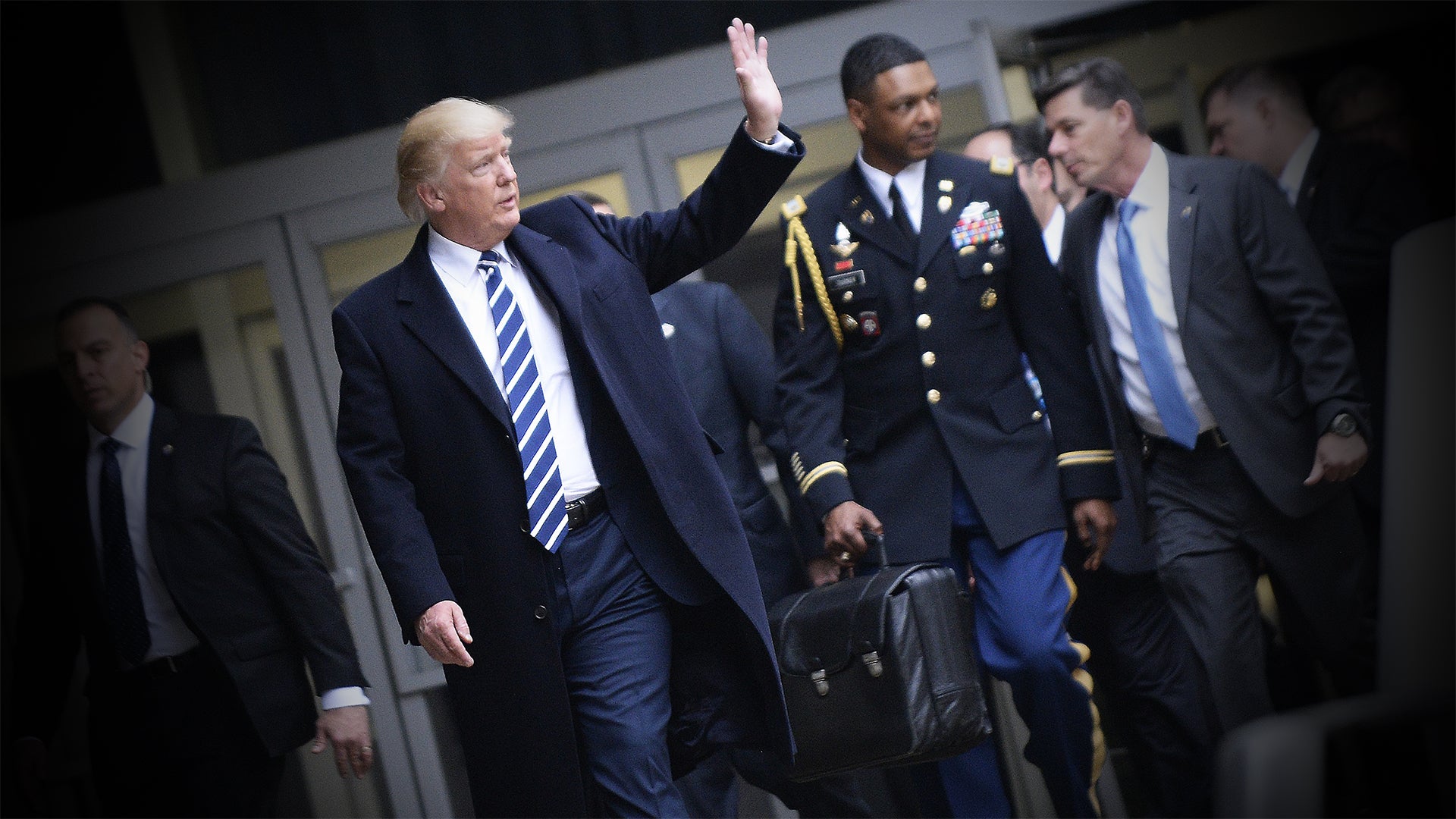In his annual New Year speech, North Korean premier Kim Jong-un has declared he has a “nuclear button” at the ready in the event that the United States or its allies seek to overthrow the country’s Communist regime. Now, U.S. President Donald Trump has responded with his own trademark invective, which seems almost guaranteed to provoke some sort of response from the ever defiant Hermit Kingdom and will undoubtedly stir-up controversy here at home and abroad.
Late on Jan. 2, 2018, Trump took to his preferred outlet, Twitter, to slam Kim over his pronouncement and mock North Korea’s growing nuclear weapons and missile capabilities. In the past, the President has made bold threats of “fire and fury” against the North Korean regime and suggested it might be necessary to “totally destroy” the country if the government in Pyongyang doesn’t abandon its advanced weapons programs.
“North Korean Leader Kim Jong Un just stated that the “Nuclear Button is on his desk at all times.'” Trump Tweeted out. “Will someone from his depleted and food starved regime please inform him that I too have a Nuclear Button, but it is a much bigger & more powerful one than his, and my Button works!”
Kim’s comments had actually come three days earlier in a routine address in which the North Korean leader also touted his country’s relatively modest industrial achievements, including increased production of consumer goods, as evidence of the pariah state’s success in defying its international opponents. Many of those industries, such as automotive and chemical concerns, have a dual-purpose relationship to the country’s advanced weapons programs, though.
These “nuclear buttons” are likely figurative, with such phrases usually referring broadly to complex nuclear command and control structures and the U.S. military’s nuclear arsenal is without a doubt far larger and more capable than North Korea’s. It doesn’t make the two pronouncements any less serious, especially when taken together, though.
The War Zone’s own Tyler Rogoway had already noted how uncertain the situation on the Korean Peninsula still is despite the relatively muted nature of Kim’s remarks, writing:
The speech comes on the same day that former Chairman of the Joint Chiefs of Staff Admiral Mike Mullen gave a dire warning about the collision course the U.S. and North Korea are presently on. With Pyongyang unwilling to denuclearize and no real pathway being offered by the Trump Administration to enter into direct negotiations, the chances that there could be a peaceful deescalation through diplomacy seem increasingly slim.
It also comes as allegations stack up against China and Russia that they are cheating on U.N. sanctions against North Korea by executing ship-to-ship transfers of contraband fuel reserves to the rogue nation. These developments are troubling to say the least and undermine the power the U.N. has when it comes to having its own members enforce its resolutions. Ships are now being seized and the whole affair seems to be inching toward a naval blockade of the country, a tactic we pointed out last September as a possible option to put extreme pressure on the North Korean regime.
With North Korea’s nuclear and ballistic missile programs leaping far ahead of almost all estimates last year, and as a threat of an atmospheric nuclear test over the Pacific looming, not to mention tensions between the Kim regime and the Trump administration at an all time high, there is even more uncertainty surrounding the high-stakes standoff going in to 2018 than there was going into 2017.
Earlier on Jan. 2, 2018, U.S. Ambassador to the United Nations Nikki Haley had also warned North Korea against any more provocative missile tests. In addition, she indicated that the United States would reject the results of any talks between North Korean and South Korean officials that did produce a clear path to the regime in Pyongyang abandoning its nuclear weapons.
“North Korea can talk to anyone they want,” Haley said. “But the U.S. is not going to recognize it or acknowledge it until they agree to ban the nuclear weapons that they have.”
North and South Korean authorities have indicated a willingness to coordinate ahead of the 2018 Winter Olympics, which will begin in February in the South Korean city of Pyeongchang. Kim even mentioned this possibility directly in his New Year address. Observers and experts have suggested this could be an important opening to de-escalate tensions on the Korean Peninsula that have been steadily building since the beginning of 2017.
U.S. State Department spokeswoman Heather Nauert was also skeptical of the proposed meetings, saying it appeared to be a North Korean attempt at “trying to drive a wedge of some sort” between officials in Washington and Seoul. In an earlier Tweet on Dec. 2, 2017, Trump had taken a softer tone, saying the potential for talks between the two Koreas could be “good news, perhaps not – we will see!”
Talks between the North and South would hardly be unprecedented, though. The two countries have engaged each other directly multiple times since the Armistice established an uneasy ceasefire between the two, even establishing a joint economic zone north of the demilitarized zone in 2003. Now disgraced former President Park Geun-hye ended South Korea’s involvement with the site in protest over North Korean provocations in 2016, but current President Moon Jae-in has said he is interested in rebooting that project.
Now, though, Trump’s comments will almost certainly produce a response of some sort from North Korea, but we’ll have to wait and see what form it takes and what impact, if any, it might have on immediate diplomatic engagements with South Korea.
Contact the author: joe@thedrive.com
